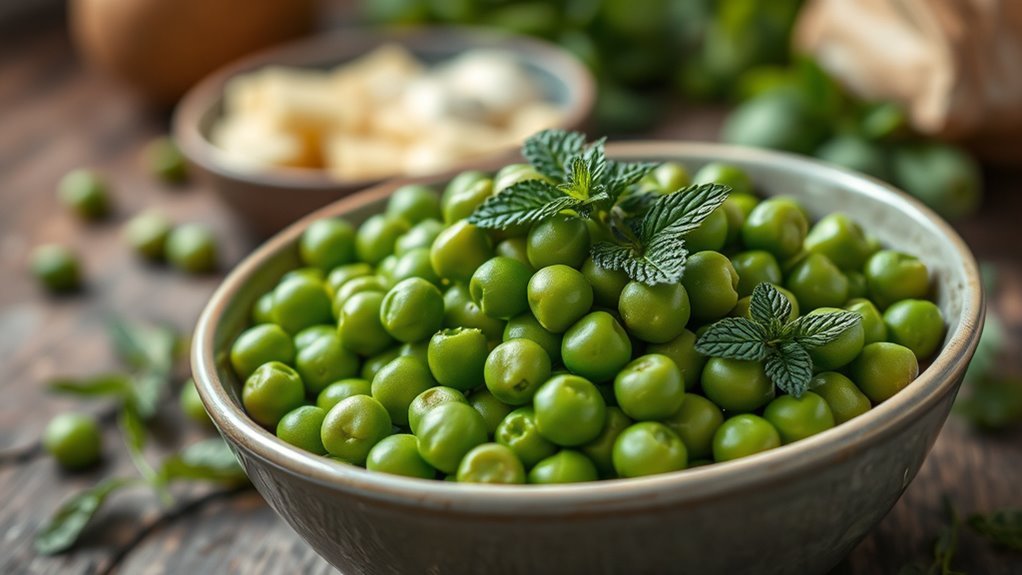Peas aren’t considered very keto-friendly due to their higher carbohydrate content, averaging around 14 grams per cup. Consuming too many can hinder ketosis, which is why it’s important to monitor your intake. A ½ cup of cooked peas is a better option if you want to include them occasionally. Balancing them with high-fat foods can enhance your meals. Discovering more about their nutritional profile and alternatives can help you make informed choices on your keto journey.
Understanding the Keto Diet

When you plunge into the keto diet, it’s essential to understand its foundational principles. Many keto misconceptions can cloud your judgment, leading to unsustainable practices. The diet’s core focus is shifting your body into ketosis, where it burns fat for fuel instead of carbohydrates. However, sustainability is important; if the diet feels restrictive or overwhelming, you’re less likely to stick with it long-term. Aim for a balanced intake of healthy fats, moderate protein, and minimal carbs. Educating yourself on food choices and meal planning can empower you, enhancing your freedom to enjoy diverse foods while maintaining ketosis. By grasping these principles, you can navigate the keto landscape effectively, ensuring a lifestyle that supports both your health and well-being.
Nutritional Profile of Peas

Although peas are often celebrated for their vibrant color and sweet flavor, their nutritional profile reveals a complex interplay of macronutrients that can impact those following a keto diet. Different pea varieties, such as green peas, snow peas, and snap peas, each offer unique health benefits. For instance, they’re rich in vitamins A, C, and K, along with essential minerals like iron and magnesium. Additionally, peas provide a good source of plant-based protein and dietary fiber, contributing to overall health. However, their carbohydrate content may be a concern for those strictly adhering to keto. Understanding these nuances allows you to make informed choices about incorporating peas into your diet while balancing your nutritional goals.
Carbohydrate Content in Peas

While peas are a nutritious addition to many diets, their carbohydrate content can pose challenges for those following a keto lifestyle. Peas primarily contain complex carbohydrates, which are generally healthier than simple sugars. However, they still contribute a significant amount of carbs, averaging around 14 grams per cup. This can impact your daily carb limit on a ketogenic diet. Additionally, peas have a moderate glycemic index, which means they can cause a moderate increase in blood sugar levels. If you’re aiming for ketosis, it’s crucial to monitor not just the total carbs, but also the types of carbohydrates you consume. Balancing your intake of peas with lower-carb options can help maintain your keto freedom while still enjoying their benefits.
Comparing Peas to Other Vegetables
When you compare peas to other vegetables, you’ll find significant differences in their nutritional profiles. For instance, while peas provide a decent amount of protein and fiber, their carbohydrate content can be higher than that of leafy greens. Analyzing these factors helps you make informed choices within a keto framework.
Nutritional Profile Comparison
As you explore the nutritional profiles of various vegetables, it’s essential to contemplate how peas stack up against their counterparts. Peas offer impressive nutrient density, providing essential vitamins like A, C, and K, alongside minerals such as iron and magnesium. Their fiber content stands out, contributing to digestive health and promoting a feeling of fullness. When compared to other vegetables like broccoli or spinach, peas may have a slightly higher carbohydrate count, but they compensate with their rich protein content. This combination of nutrients makes peas a valuable addition to a balanced diet. Ultimately, understanding these aspects can help you make informed choices while maneuvering your dietary preferences and goals.
Carbohydrate Content Analysis
Although many vegetables are low in carbohydrates, an analysis of peas reveals that they contain a moderate amount compared to options like zucchini or leafy greens. Peas typically provide about 14 grams of carbohydrates per cup, which positions them higher on the scale of carbohydrate sources. While they do have a relatively low glycemic index, meaning they cause a slower rise in blood sugar levels, it’s essential to take into account portion sizes if you’re following a strict keto diet. In contrast, non-starchy vegetables like spinach or cucumbers offer fewer carbs and can be more suitable for maintaining ketosis. Ultimately, if you love peas, enjoy them in moderation, balancing them with lower-carb veggies to stay aligned with your dietary goals.
Impact of Peas on Ketosis
While many people embrace the ketogenic diet for its potential benefits in weight loss and metabolic health, the inclusion of certain foods, like peas, can greatly impact ketosis. Different pea varieties, such as green peas and snap peas, contain varying carbohydrate levels that can affect your state of ketosis. For instance, green peas have around 14 grams of carbs per cup, which can quickly add up in a strict keto plan. Consuming these can lead to ketosis effects that hinder your goals, particularly if you exceed your daily carb limit. As a result, if you’re keen on maintaining ketosis, it’s vital to monitor your pea intake and consider alternatives that align better with your dietary needs without jeopardizing your ketogenic journey.
Benefits of Including Peas in Your Diet
Peas can offer numerous health benefits, making them a valuable addition to many diets, even if they pose challenges for those on a strict ketogenic plan. One of the standout features of peas is their nutrient density; they’re packed with vitamins A, C, K, and essential minerals like iron and magnesium. This makes them a powerhouse for supporting overall health. Additionally, the fiber benefits of peas are significant. They help with digestion, promote a feeling of fullness, and can aid in regulating blood sugar levels. Including peas in your diet can enhance nutrient intake while providing a satisfying addition to meals, making it easier to achieve your health goals without sacrificing flavor or variety.
Portion Control and Serving Suggestions
When incorporating peas into your keto diet, it’s essential to reflect on ideal serving sizes to maintain your macronutrient balance. Pairing peas with high-fat foods can enhance flavor while keeping your carb intake in check. Additionally, meal frequency plays a key role in how you can effectively include peas without exceeding your daily carb limit.
Ideal Serving Sizes
Finding the right serving size for peas on a keto diet is essential for maintaining your carbohydrate intake while still enjoying their nutritional benefits. The ideal portion sizes can help you stay within your daily carb limits without sacrificing flavor or nutrition. Generally, a recommended serving is about ½ cup of cooked peas.
Here’s a quick reference table to guide your servings:
| Serving Size | Carbohydrates (g) |
|---|---|
| ½ cup cooked peas | 12 |
| 1 cup cooked peas | 24 |
| ¼ cup frozen peas | 6 |
| ½ cup raw peas | 7 |
| 1 cup raw peas | 14 |
Monitoring these recommended servings allows for flexibility while keeping your keto goals intact.
Pairing With Other Foods
Although incorporating peas into your keto meal plan can be delicious, pairing them with the right foods is essential for maintaining your carbohydrate goals. To keep your meals balanced while enjoying those delightful pea pairings, consider these suggestions:
- Grilled chicken: A lean protein that complements peas well.
- Leafy greens: Spinach or kale provide fiber without adding many carbs.
- Avocado: Healthy fats can enhance flavor and texture.
- Cheese: Opt for high-fat varieties, like cheddar or feta, to enrich your meal.
- Olive oil: Drizzling this over your dish can boost healthy fat intake.
Meal Frequency Considerations
Pairing peas with protein and healthy fats can create satisfying meals, but understanding meal frequency and portion control is essential to staying on track with your keto goals. Pay attention to meal timing and listen to your hunger cues. Eating smaller portions more frequently can help you maintain energy levels and prevent cravings. Consider enjoying peas in moderation—about half a cup per serving—while complementing them with nutrient-dense foods like chicken or avocado. This approach allows you to enjoy the benefits of peas without exceeding your carb limits. Additionally, spacing meals throughout the day can enhance satiety, making it easier to stick to your plan. Ultimately, it’s about finding a balance that works for you while respecting your body’s signals.
Alternatives to Peas on a Keto Diet
When you’re on a keto diet, it’s essential to find low-carb alternatives to common foods like peas, which are relatively high in carbs. Fortunately, there are plenty of keto-friendly vegetables that can easily replace peas in your meals. Here are some great options:
- Green beans: Low in carbs and high in fiber.
- Zucchini: Versatile and can be spiralized for pasta.
- Broccoli: Packed with nutrients and very low in carbs.
- Cauliflower: A fantastic substitute for many starchy dishes.
- Spinach: Nutrient-dense and perfect for salads or smoothies.
Final Thoughts on Peas and Keto Compatibility
While peas offer some nutritional benefits, their higher carbohydrate content can make them less compatible with a strict keto diet. Many people fall for keto misconceptions, believing all vegetables are equally suitable for low-carb lifestyles. However, if you’re aiming to stay within your carb limits, it’s wise to evaluate pea alternatives like zucchini, cauliflower, or leafy greens. These options can provide essential nutrients with considerably fewer carbs, aligning better with your dietary goals. Ultimately, if you enjoy peas, moderation is key. You can incorporate them occasionally while focusing on lower-carb choices most of the time. Prioritizing your health and preferences allows you the freedom to tailor your diet without feeling deprived. Choose what’s right for you and enjoy your journey!
Frequently Asked Questions
1. Are peas keto friendly?
Peas are generally considered to be higher in carbohydrates compared to other low-carb vegetables. A 100-gram serving of green peas contains about 14 grams of carbohydrates, which may not fit well within the strict carb limits of a ketogenic diet. However, in moderation, they can be included in a keto meal plan, especially if you focus on portion control and balance them with low-carb foods.
2. What types of peas are there, and how do their carb counts compare?
There are several types of peas, including green peas, snow peas, and snap peas. Green peas are the highest in carbohydrates. In a 100-gram serving, green peas have about 14 grams of carbs, while snow peas and snap peas have slightly lower counts at around 7-8 grams of carbs per 100 grams. If you’re following a keto diet, snow and snap peas may be better options due to their lower carb content.
3. Can I eat peas on a low-carb diet?
Yes, you can include peas in a low-carb diet, but it’s essential to monitor your portion sizes. If you are following a strict low-carb or ketogenic diet, it’s advisable to limit your intake to small amounts to ensure you stay within your carb limits. Using peas as an occasional ingredient in salads or dishes can be a tasty way to enjoy their nutritional benefits without exceeding your carb goals.
4. What are the nutritional benefits of peas?
Peas are packed with essential nutrients. They are a good source of protein, fiber, vitamins (such as vitamin A, C, K, and several B vitamins), and minerals (including iron and magnesium). The fiber content helps with digestion, while the protein supports muscle health. Despite their carb content, they also offer antioxidants and other phytonutrients that contribute to overall health.
5. How can I incorporate peas into my keto meal plan?
To incorporate peas into your keto meal plan, consider using them sparingly in dishes like stir-fries, salads, or soups. You can also combine them with other low-carb vegetables to create a balanced meal. For example, mixing a small amount of peas with leafy greens, avocado, and proteins like chicken or tofu can create a nutritious and satisfying dish while keeping your carb intake in check.


